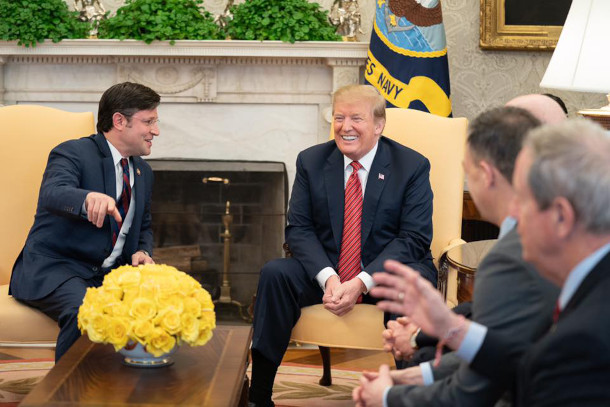A Climate Skeptic House Speaker
Air Date: Week of November 3, 2023

Representative Mike Johnson (LA-04) was elected House Speaker in October 2023. (Photo: Office of Speaker Mike Johnson, Wikimedia Commons, Public Domain)
The new House Speaker, Republican Mike Johnson of Louisiana, has voted for legislation on the environment and some key social issues just 2% of the time, from the perspective of the League of Conservation Voters. Senior VP of Government Affairs Tiernan Sittenfeld joins Host Jenni Doering to voice LCV’s concerns about Speaker Johnson’s climate skepticism, oil and gas industry campaign contributions and bids to repeal President Biden’s signature climate law.
Transcript
CURWOOD: It’s Living on Earth, I’m Steve Curwood
DOERING: And I’m Jenni Doering.
After tumultuous weeks of failed votes, the Republican led House of Representatives finally elected a new Speaker of the House on October 25th. Speaker Mike Johnson represents the 4th congressional district in Louisiana, a state that’s an oil and gas hub. Speaker Johnson’s far-right conservative record and endorsement by former President Trump have drawn sharp criticism from many liberals and moderates, including progressive conservation advocates. The left-leaning League of Conservation Voters keeps track of how elected officials vote on legislation on the environment and some key social issues. And from their perspective Speaker Johnson has only aligned with them two percent of the time since first winning his seat in 2017. Tiernan Sittenfeld is the Senior Vice President of Government Affairs for the League of Conservation Voters and she joins me now from Washington. Tiernan, welcome back to Living on Earth!
SITTENFELD: Thank you for having me. It's good to be back.
DOERING: So, Speaker Mike Johnson has a League of Conservation Voters lifetime score of 2%. That's almost as low as it gets. What does that actually mean?
SITTENFELD: Unfortunately, Speaker Mike Johnson is incredibly extreme across the board. And that is absolutely the case when it comes to his record on combating the climate crisis, on clean energy, on environmental justice. Basically, at every step, he has stood in the way of progress on all of that. I think he's literally taken only four votes that we would consider pro-environment out of more than 160 during the course of his career. Those are the votes that the League of Conservation has included in our national environmental scorecard during the time that he has been in Congress. And that is just appalling. To vote against the air we breathe, the water we drink, the lands we cherish 98% of the time, is just beyond the pale. And we need to ask ourselves, why is he doing that? And one of the very biggest reasons, is the large amounts of money that he has taken from the oil and gas industry. And to call him a climate skeptic is generous, he's said outrageous things about climate change, and what's causing it, whether he believes it's happening. And then even just in his first few days as Speaker, he has gone after the affordable clean energy plan that's known as the inflation Reduction Act. It's the biggest step our country has ever taken to combat the climate crisis, to invest in environmental justice, to advance clean energy jobs, and make sure that they are good-paying, family-sustaining jobs. And he is trying to gut that, he is going after badly needed funding at the Environmental Protection Agency, and so much more. So this is someone who is really extreme and acting at the behest of Big Oil day in and day out.
DOERING: So 2% is an extremely low score, in terms of this environmental scorecard from the League of Conservation Voters. But how does that compare to other members of Congress?

Speaker Johnson has taken over $330,000 in donations from the fossil fuel industry, according to LCV. (Photo: Gage Skidmore, Flickr, CC BY-SA 2.0)
SITTENFELD: Well, perhaps a good comparison would be to the former speaker, Kevin McCarthy. His was 4%. So actually, I guess you could say double what the current speaker has. But whether it's 2%, which is what Speaker Mike Johnson has, or 4%, what former Speaker Kevin McCarthy had, those are appalling. And we also saw that as Speaker, Kevin McCarthy, really had the House cater to polluters, especially to Big Oil and Gas day in and day out. They have gone after the very popular Inflation Reduction Act and the clean energy provisions that are really jumpstarting a clean energy economy. Supercharging it, in fact, I would say. In fact, our partners Climate Power are out with a new report that since the enactment into law, the inflation Reduction Act, there have been more than 210,000 jobs created in the clean energy space. There are new clean energy projects in 45 states across the country. So we are seeing incredible progress. So then it really does beg the question of why would this new Speaker be trying to gut all of that and overturn it? I think what we're seeing is just the Republican leadership of the House of Representatives, is catering to over-the-top, irresponsible parts of their party. And I think they do so clearly at the peril of our planet, and also at the political peril of many of their incumbents. And they do not have a mandate to be gutting this progress. Our polling shows across the country, people overwhelmingly support clean energy jobs, want investments in climate solutions and environmental justice, are more likely to support candidates who believe that the climate crisis is a problem and that addressing it provides all kinds of opportunities.
DOERING: Well, so bipartisan work does seem fairly rare these days in Congress. But what kind of bipartisan legislation on the environment and climate might provide a path forward for Democrats and Republicans to work together in the coming months on these urgent issues?

Speaker Mike Johnson holds several far-right political positions and led House attempts to overturn the 2020 presidential elections. (Photo: Office of Speaker Mike Johnson, Wikimedia Commons, Public Domain)
SITTENFELD: Well, we would love to get back to a place where Democrats and Republicans come together to pass really necessary environmental legislation. And this is actually at the start of the environmental movement. And if you think of our bedrock environmental laws: the Clean Air Act, the Clean Water Act, the Endangered Species Act, all of these bedrock environmental laws were passed by overwhelming bipartisan majorities, and then signed into law by a Republican president. But unfortunately, with Citizens United, with the Koch brothers, with the incredibly corrosive impact of fossil fuel money flooding into Republican candidate coffers, we have seen that the Republican Party has really abandoned its historic conservation roots and now stands in the way of clean air, clean water, protecting our public lands. Obviously, at the League of Conservation Voters we believe strongly that we can't have a healthy climate without a healthy democracy, that they are inextricably linked. And again, we're talking mostly about climate. But if you look at him being one of the architects of trying to overturn the 2020 elections, if you look at where he stands across the board on LGBTQ+ issues, on abortion, he is extreme to the maximum.
DOERING: Well, so there are members of Congress and their views on issues. But then there's also just average Republican voter. And increasingly, we're seeing young Republican voters really speak out about climate change, and we need to do something about this climate crisis. So what do you think that means in terms of the way that the rhetoric on climate in the Republican party might need to shift over the years?
SITTENFELD: We know that people across this country absolutely are concerned about the climate crisis, this is not a distant threat. It is not abstract. It is the reality that people are experiencing and suffering from today. From floods, to fires, to record-breaking heat, it is causing untold suffering. And people want solutions. And the good news is they know that the solutions are there. We are already seeing good-paying, family-sustaining jobs being created, thanks to the Inflation Reduction Act all across the country. And we're seeing record investments in environmental justice, while of course, much more is needed. So we know that this is popular, including with Republicans, especially with young Republicans, because they know their future is on the line. And so I would say that Republicans in Congress are out of step, not just with most people in the country, but even with a lot of Republicans and certainly with most young Republicans who really do want them to support and invest in climate solutions, rather than acting at the behest of Big Oil every single day.

Tiernan Sittenfeld is the Senior Vice President of Governmental Affairs for the League of Conservation Voters. (Photo: Courtesy of League of Conservation Voters)
DOERING: And what opportunities do you see for younger, climate-concerned Republicans to push Speaker Johnson to move some legislation forward?
SITTENFELD: I think young Republicans around the country have a big opportunity to push their elected officials. At the League of Conservation Voters and with our 30+ state LCV partners around the country, we put out a national environmental scorecard that people are able to track in real time how their elected officials are voting when it comes to these pressing issues. And are they standing up for clean energy and environmental justice and climate solutions? Not to mention, clean air, clean water, democracy, so much more? Or are they siding with their polluter allies? At LCV, we often say that elections have consequences. We are seeing the most stark contrast from Democrats coming together and doing the biggest thing ever on climate, environmental justice, and clean energy with the Inflation Reduction Act in the last Congress. There were actually some bipartisan legislative victories in the previous Congress. And now we are seeing this extreme, MAGA, House Republican leadership grind all of that to a halt. The great thing is we still have a pro-environment majority now as it is in the Senate, and we still have the Biden-Harris administration working to make progress through their executive action, especially at EPA for things like power plants and clean cars and trucks and methane. But we are hurtling toward the 2024 elections. This election cycle could not be more important. The stakes could not be higher, so people absolutely need to get out there and vote and to help elect environmental champions up and down the ballot.
DOERING: Tiernan Sittenfeld is Senior Vice President of Government Affairs for the League of Conservation Voters. Thank you so much, Tiernan.
SITTENFELD: Thank you, Jenni.
DOERING: We have invited Speaker Mike Johnson or someone from his team to speak with us but have yet to hear back. We have also reached out to the Republican Conservative Climate Caucus led by Utah Congressman John Curtis to discuss the likely environmental agenda of the new Speaker. By the way, although Speaker Mike Johnson has just a 2 percent score from the League of Conservation Voters, there are some Republican members of the House who have earned significantly higher lifetime scores in part because of their willingness to vote for bipartisan environmental legislation. They include New Jersey members Jefferson Van Drew and Christopher Smith with scores of 55 and 60 percent, respectively, and Brian Fitzpatrick of Pennsylvania with an LCV score of 74%.
Links
The League of Conservation Voters | “LCV Statement on House Republican Speaker”
Living on Earth wants to hear from you!
Living on Earth
62 Calef Highway, Suite 212
Lee, NH 03861
Telephone: 617-287-4121
E-mail: comments@loe.org
Newsletter [Click here]
Donate to Living on Earth!
Living on Earth is an independent media program and relies entirely on contributions from listeners and institutions supporting public service. Please donate now to preserve an independent environmental voice.
NewsletterLiving on Earth offers a weekly delivery of the show's rundown to your mailbox. Sign up for our newsletter today!
 Sailors For The Sea: Be the change you want to sea.
Sailors For The Sea: Be the change you want to sea.
 The Grantham Foundation for the Protection of the Environment: Committed to protecting and improving the health of the global environment.
The Grantham Foundation for the Protection of the Environment: Committed to protecting and improving the health of the global environment.
 Contribute to Living on Earth and receive, as our gift to you, an archival print of one of Mark Seth Lender's extraordinary wildlife photographs. Follow the link to see Mark's current collection of photographs.
Contribute to Living on Earth and receive, as our gift to you, an archival print of one of Mark Seth Lender's extraordinary wildlife photographs. Follow the link to see Mark's current collection of photographs.
 Buy a signed copy of Mark Seth Lender's book Smeagull the Seagull & support Living on Earth
Buy a signed copy of Mark Seth Lender's book Smeagull the Seagull & support Living on Earth

